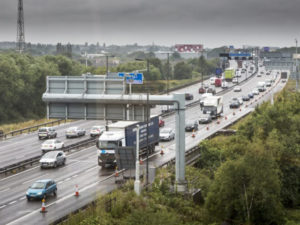Van traffic on British roads hit a new high in 2018 as well as recording the fastest growth in percentage terms of any motor vehicle type.

New Department for Transport Road Traffic Estimates show van traffic grew 0.9% between 2017 and 2018 to reach a record high of 51.0 billion vehicle miles, outstripping the 0.2% growth in car traffic and 0.3% in lorries as well as the 0.3% growth seen in overall vehicle traffic.
In fact, van traffic rose to new record highs on all road types except urban roads between 2017 and 2018. Motorways and rural ‘A’ roads carried over half of all van traffic in 2018.
Van traffic was also up 97.3% from 1993 and now makes up around 16% of total traffic, compared to 10% 25 years ago.
The DfT attributed the rise to the increase in the number of licensed vans, which rose 88% between 1994 and 2018, from 2.1 to 4.0 million. In contrast to the trend seen in average car mileage, the average annual mileage per van in Great Britain (estimated from van vehicle miles divided by van stock) has remained stable, at around 13,000 miles per year.
Key reasons given by the DfT for the growth include rising use of internet shopping. In 2018, 78% of adults shopped online at least once compared to 53% in 2008.
Changes to company car taxation rules and vehicle excise duty in the early-to-mid 2000s, may have made vans a cheaper alternative and so caused people to switch to vans from cars.
Meanwhile, less strict regulation on driver training, driver’s hours restrictions and roadworthiness testing for vans than for lorries may have encouraged businesses to substitute vans for small lorries.
The AA has added that the figures also provide insight into how freight companies might be changing their fleets in the wake of Clean Air Zones (CAZ).
Edmund King, AA president, said: “Many towns and cities looking to introduce CAZ will impose fees on big trucks and lorries, so in an effort to beat the charge, a convoy of vans could replace a single lorry.
“This in turn would have an adverse impact on local areas as there would be additional vehicles on the road, creating more congestion, and more pollution.
“As more than three quarters (78%) of all the nations goods are transported by road, should the majority of freight companies change their model in this way it could have a severe impact on congestion.
“If we are going to get to grips with improving road-based air quality, more must be done by both Government and local councils to get the balance right between penalising gross polluting vehicles and greener methods of delivery.”

